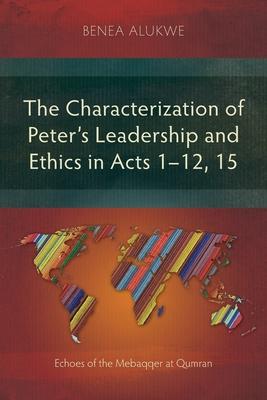The world is in desperate need of trustworthy leaders - men and women of character, who demonstrate honesty, humility, courage, and compassion. Such leaders are crucial to the success and stability of governments, corporate bodies, institutions, and faith communities. In this study, Dr. Benea Alukwe explores the principles at work in Peter's leadership of the early church as it transformed from a frightened group of secret disciples into an indestructible force with world-changing potential. Examining the depiction of Peter's character in Acts 1-12 and 15, he demonstrates the parallels between Peter's leadership values and those practiced by the Qumran community as recorded in the Damascus Document. The ethical foundation depicted in both texts offers a powerful counter-cultural narrative of leadership capable of revitalizing nations, societies, and the church itself.

The Characterization of Peter's Leadership and Ethics in Acts 1-12, 15: Echoes of the Mebaqqer at Qumran
The world is in desperate need of trustworthy leaders - men and women of character, who demonstrate honesty, humility, courage, and compassion. Such leaders are crucial to the success and stability of governments, corporate bodies, institutions, and faith communities. In this study, Dr. Benea Alukwe explores the principles at work in Peter's leadership of the early church as it transformed from a frightened group of secret disciples into an indestructible force with world-changing potential. Examining the depiction of Peter's character in Acts 1-12 and 15, he demonstrates the parallels between Peter's leadership values and those practiced by the Qumran community as recorded in the Damascus Document. The ethical foundation depicted in both texts offers a powerful counter-cultural narrative of leadership capable of revitalizing nations, societies, and the church itself.